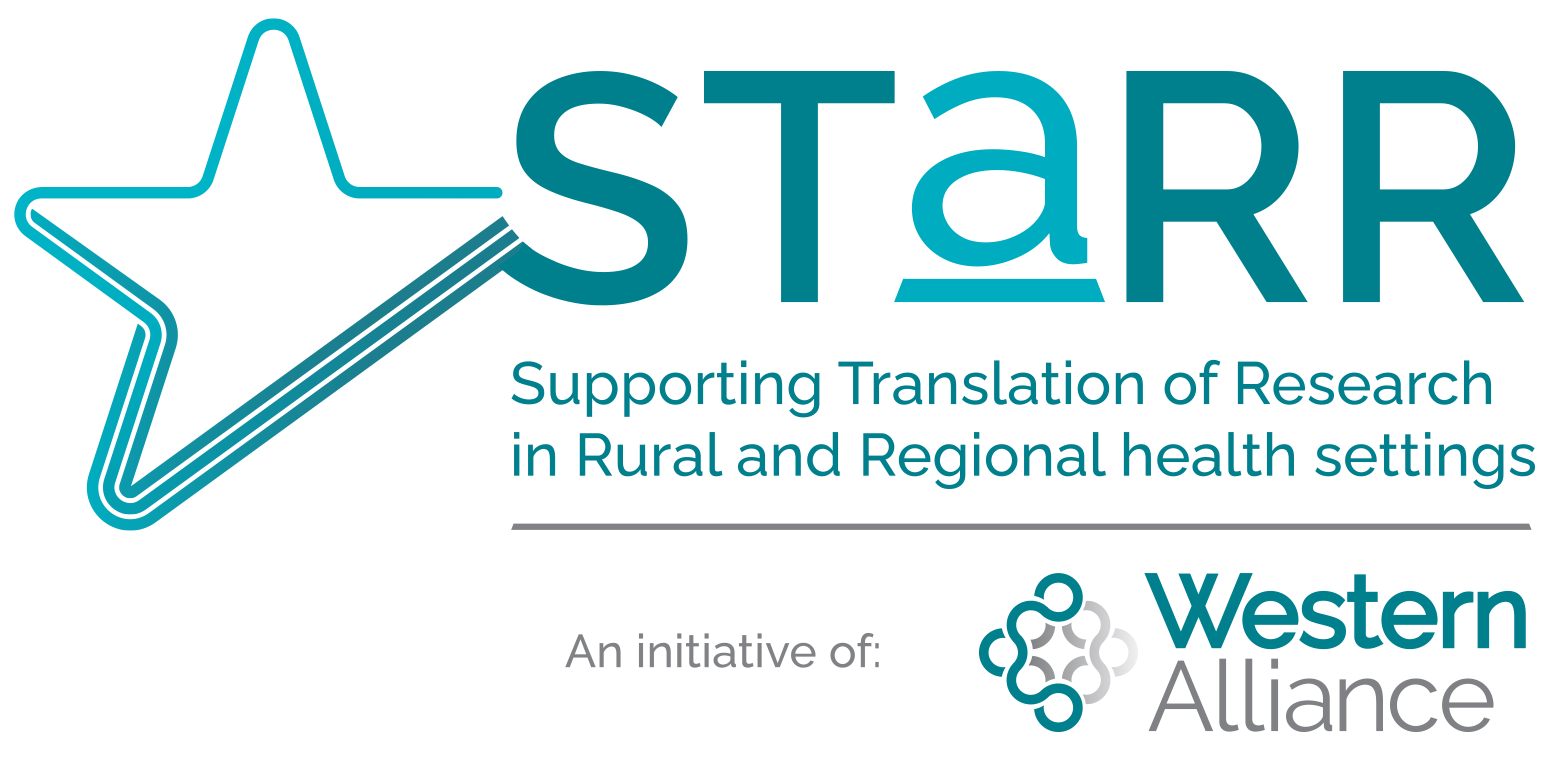STaRR Training
With support from the Victorian Department of Health, Western Alliance is delighted to provide our centrepiece research capability building program, known as the STaRR (Supporting Translation of Research in Rural and Regional areas) Program.
The STaRR Program was informed by a comprehensive scoping exercise, which included a systematic scoping review of the research education literature and the Victorian Rural/Regional Research Training Needs Project. The STaRR Program builds on the support from our Research Translation Coordinator positions and includes a range of translation-focussed research training activities and resources, as well as support for organisation research planning.
STaRR training supports three key groups:
- Emerging health practitioner researchers in health organisations across our region
- Research mentors
- Health organisation managers and leaders
Click here to meet the STaRR Class of 2025!
STaRRlite 2026: registrations now open
STaRRlite is a half-day online introductory research training workshop for people working in health settings across western Victoria,
STaRRlite is designed for health practitioners, including clinicians, program staff and managers who would like to gain foundational knowledge and skills to begin or support a team member in engaging in a health research or quality improvement project.
STaRRlite is open to all staff working at a Western Alliance member health organisation.*
Western Alliance covers the cost of the workshop, and those with little or no previous research or quality improvement experience are encouraged to participate.
To find out if STaRRlite is right for you, please contact your Research Translation Coordinator or Alison Buccheri via starrsupport@deakin.edu.au.
2026 Workshops
Western Alliance’s 2026 STaRRlite online workshop dates are:
- 9am – 12:30pm, Wednesday 25 February 2026
- 9am – 12:30pm, Tuesday 17 March 2026
Places are limited, so please register your interest HERE early.
Registrations close on 6 February 2026. Note that we will aim to ensure equitable access for staff working across all Western Alliance member organisations.
* Barwon Health, Colac Area Health, East Grampians Health Service, Grampians Health, Maryborough District Health, Portland District Health, South West Healthcare, Western District Health Service, Western Victoria Primary Health Network
To share this information as a flyer, please click here.
Read more about STaRR below:
- General introduction to research
- Common data collection techniques
- Developing a researchable question
- Introduction to data analysis
- Health service ethics and governance
- Research dissemination and impact
- Introduction to research methods Consumer and stakeholder engagement
- Introduction to a research translation framework Working with your mentor
Western Alliance is committed to building research and translation capability in Western Victoria. To support STaRR Emerging Researchers conduct translation-focused research, Western Alliance offers the following funding opportunities:
- STaRR Emerging Researcher Seed Grants of up to $5,000 available for past STaRR participants to conduct a research project to generate new evidence, and
- Research Translation Fellowships (STaRRships) with funding of up to $15,000 available for past STaRR participants and past Western Alliance Emerging Researcher grant recipients, to translate research evidence into practice.
Guidelines
To be considered, applicants must work in a Western Alliance member health service or primary health network and must have participated in the STaRR Emerging Researcher training program. See more details about eligibility in the STaRR Emerging Researcher Seed Grants guidelines and the STaRRships guidelines documents.
Click here to read about the recipients of 2025 STaRR Emerging Researcher Grants
STaRRlite is:
- A half-day online research workshop open to staff working at a Western Alliance member health organisation*
- Designed for health practitioners (including clinicians, program staff & managers) with little or no previous research or quality improvement experience
- Ideal for practitioners who want to gain foundational knowledge & skills to begin health research or quality improvement projects, or leaders who want to support their team member(s) to do so
Cost: Free (Western Alliance covers the workshop costs)
More info: Click here or Contact Alison Buccheri via starrsupport@deakin.edu.au
*Barwon Health, Colac Area Health, East Grampians Health Service, Grampians Health, Maryborough District Health Service, Portland District Health, South West Healthcare, Western District Health Service, Western Victoria Primary Health Network
Supporting research and translating capacity and capability-building using evidence-informed approaches
STaRR is an evidence-informed research capability building program. We continue to explore the most effective ways to build research capacity and capability through our research.
You can read more about the evidence we have generated through developing, delivering and evaluating the STaRR Program by following links to our peer-reviewed research articles below.
- King, O., West, E., Lee, S., Glenister, K., Quilliam, C., Wong Shee, A., & Beks, H. (2022). Research education and training for nurses and allied health professionals: a systematic scoping review. BMC Medical Education, 22(1), 385. https://link.springer.com/article/10.1186/s12909-022-03406-7
- King, O. A., Sayner, A., Beauchamp, A., Hitch, D., Aras, D., & Shee, A. W. (2023). Translating research into rural health practice: a qualitative study of perceived capability-building needs. Rural and Remote Health, 23(4), 1-10. https://search.informit.org/doi/abs/10.3316/informit.T2024042400006590952533059
- King, O. A., Sayner, A. M., Beauchamp, A., West, E., Aras, D., Hitch, D., & Wong Shee, A. (2023). Research translation mentoring for emerging clinician researchers in rural and regional health settings: a qualitative study. BMC Medical Education, 23(1), 817. https://link.springer.com/article/10.1186/s12909-023-04786-0
- King, O., West, E., Alston, L., Beks, H., Callisaya, M., Huggins, C. E., … & Wong Shee, A. (2024). Models and approaches for building knowledge translation capacity and capability in health services: a scoping review. Implementation Science, 19(1), 7. https://link.springer.com/article/10.1186/s13012-024-01336-0
- Quilliam, C., Wong Shee, A., Corboy, D., Glenister, K., King, O., Mc Namara, K., … & McKinstry, C. (2023). Design and implementation characteristics of research training for rural health professionals: a qualitative descriptive study. BMC Medical Education, 23(1), 200. https://link.springer.com/article/10.1186/s12909-023-04169-5
- Wong Shee, A., Quilliam, C., Corboy, D., Glenister, K., McKinstry, C., Beauchamp, A., … & Mc Namara, K. (2022). What shapes research and research capacity building in rural health services? Context matters. Australian Journal of Rural Health, 30(3), 410-421. https://onlinelibrary.wiley.com/doi/full/10.1111/ajr.12852



